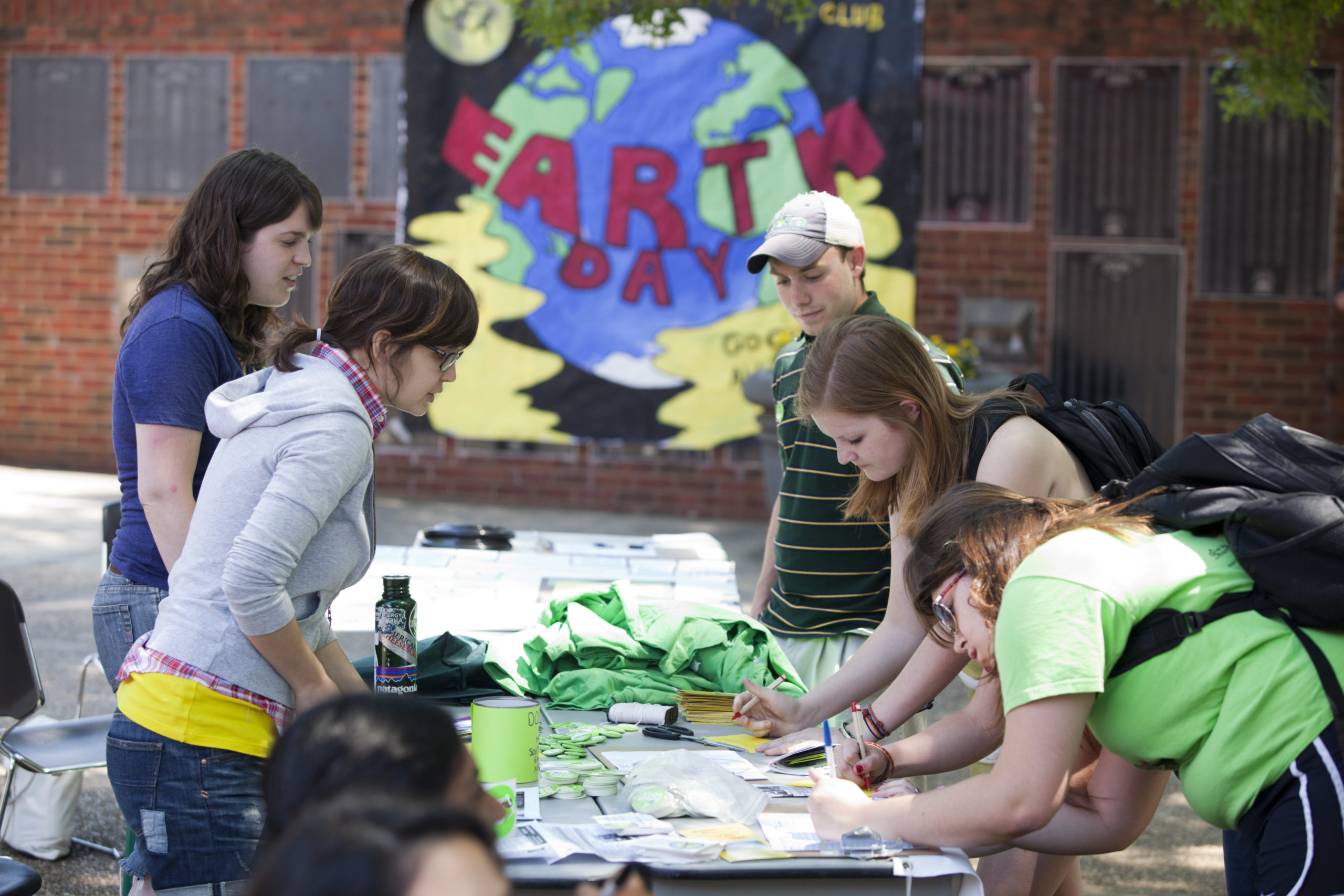Editor’s note: Because of the suspension of in-class instruction and to keep our community safe from COVID-19, G-Day and Earth Day events on campus in March and April have been canceled.
This year marks the 50th anniversary of Earth Day, and the University of Georgia is celebrating with a semesterlong series of events across campus designed to educate and inspire action for a more sustainable future.
On April 22, 1970, Earth Day was observed for the first time across the United States. Conceived in the wake of environmental disasters like the Cuyahoga River catching fire and a massive oil spill off the coast of California, Earth Day harnessed growing public alarm about pollution to put environmental protection on the national agenda. Students and faculty at the University of Georgia took part in the nationwide event, organizing a daylong, public teach-in on the environment featuring lectures, discussions and exhibitions.
“There’s no question that the first Earth Day, with an estimated 20 million participants, expressed political support and thus provided the impetus for the adoption of such ground-breaking actions as the establishment of the Environmental Protection Agency and the Clean Water Act,” said Laurie Fowler, a faculty member in the Odum School of Ecology and School of Law and the director of policy for the UGA River Basin Center, which is one of the celebration’s organizers.
Like the first Earth Day, this year’s celebration includes a teach-in — but one that will take place across campus for the entire month of April. Faculty from every department who include sustainability or environmental topics in their courses are invited to open one or more class periods to the general public. Coordinated by the UGA Office of Sustainability, the Earth Day 2020 teach-in is intended to foster cross-disciplinary education and collaboration and demonstrate the many ways environmental challenges can be addressed. Faculty can sign up to participate here.
Campus operations are part of the celebration as well. UGA Transportation and Parking Services is rolling out a new fleet of electric buses throughout the semester. Through partnerships with the UGA Athletic Association, Office of the President and Georgia Power, Sanford Stadium will be powered by renewable solar electricity during UGA’s annual G-Day spring football game on April 18 with the entire main campus being powered by solar electricity on Earth Day, April 22.
“Earth Day 2020 is an opportunity to celebrate and expand UGA efforts to implement social, environmental and economic initiatives that enhance quality of life on campus and in the communities we serve,” said Kevin Kirsche, director of the UGA Office of Sustainability, one of the Earth Day organizers. The Office of Sustainability will also host the annual Earth Day Fair from 10 a.m. to 2 p.m. on April 22 at UGA Tate Student Center Plaza. The fair will include a solar-powered tiny house, a visit from the UGA Chew Crew prescribed grazing project, and other engaging activities hosted by campus and community organizations working toward an increasingly sustainable UGA and Athens.
Other highlights include lectures by prominent speakers. On Feb. 21, the Red Clay Conference, hosted by the Environmental Law Association, will feature the Peter Appel Lecture by Love Canal activist Lois Gibbs, who led the fight for her community to be relocated after discovering that the neighborhood had been built atop 20,000 tons of chemical waste. Gibbs successfully pushed for the site to be cleaned up, and her efforts eventually led to the creation of the U.S. EPA’s “Superfund” program. Her talk and the conference is open to the public and is free for members of the UGA community but requires registration. More information is available at http://law.uga.edu/environmental-law-association.
The Willson Center for Humanities and Arts will host the Odum Environmental Ethics Lecture by Pulitzer Prize-winning author and environmental historian Jack Davis on April 16 as part of the Global Georgia Initiative public event series. On Earth Day itself, the Georgia Museum of Natural History will present the inaugural Blum Lecture by Lynn Faust, author of “Fireflies, Glow-worms, and Lightning Bugs,” published by the University of Georgia Press. Also on April 22, poet and essayist Aimee Nezhukumatathil will headline The Georgia Review’s 12th annual Earth Day program with a children’s nature-writing event in the afternoon and an evening reading to be held at the State Botanical Garden of Georgia.
The Earth Day anniversary celebration will provide opportunities for hands-on volunteer activities across campus and throughout Athens. Participants can help local organizations with projects like invasive species removal, stream monitoring and creating native plant “seed bombs.”
University students can also take part in a sustainability-focused Athens Start-up Week from April 13-17 hosted by the Terry College of Business and UGA Entrepreneurship Program, culminating in the Life’s a Pitch competition, hosted by the Society of Entrepreneurs to address global sustainability challenges through innovative business solutions.
“Earth Day 2020 is an important opportunity to celebrate and strengthen UGA’s commitment to research, teaching and service focused on healthier people, a more secure future and stronger communities,” said John Gittleman, Foundation Professor and dean of the Odum School of Ecology. “The breadth of Earth Day offerings reminds us that regardless of our area of study, whether science and engineering, arts and humanities, law, business or any other discipline, we all depend on a healthy environment, and we can all contribute in our own way.”
For a complete listing of Earth Day anniversary events, including exhibits, film screenings and conferences, visit https://sustainability.uga.edu/earthday/.


